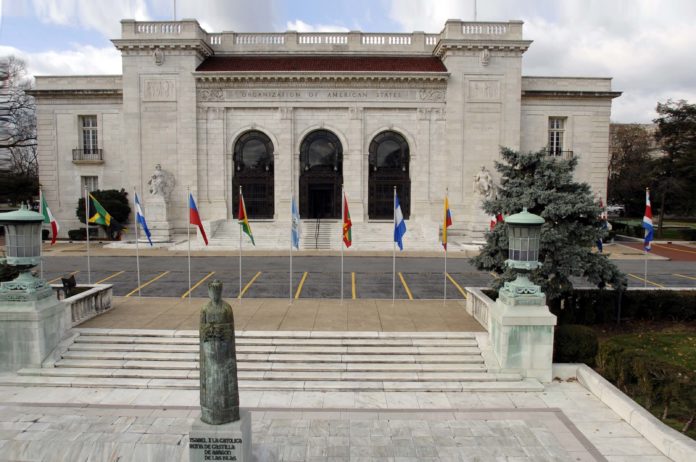The Organization of American States (OAS), through its election observers and “experts,” has played an important role in subverting democracy in both Bolivia and Haiti.
While some may find it hard to believe that this 35-member-state regional body would consciously undermine elections in this hemisphere, its actions in Bolivia today resemble what previous U.S./Canada-backed OAS missions have done in Haiti over the past two decades.
After Bolivia’s Oct. 20 presidential election, the OAS immediately cried foul. The very next day, the organization released a statement expressing “its deep concern and surprise at the drastic and hard-to-explain change in the trend of the preliminary results [from the quick count] revealed after the closing of the polls.” Two days later, they followed up that statement with a preliminary report that repeated their claim that “changes in the TREP [quick count] trend were hard to explain and did not match the other measurements available.”

But, the “hard-to-explain” changes cited by the OAS were entirely expected, as detailed in the Center for Economic Policy Research’s report “What Happened in Bolivia’s 2019 Vote Count? The Role of the OAS Electoral Observation Mission.”
The CEPR analysis points out that Morales’ percentage lead over the second-place candidate Carlos Mesa increased steadily as votes from rural, largely indigenous, areas were tabulated. Additionally, the 47.1% of the vote Morales garnered aligns with pre-election polls and the vote score for his Movement toward Socialism party. The hullabaloo about the quick count stopping at 83% of the vote was preplanned, and there is no evidence there was a pause in the actual counting.
But, the OAS’ statements gave oxygen to opposition protests. Their unsubstantiated criticism of the election has also been widely cited internationally to justify Morales’ ouster. In response to OAS claims, street protests, and Washington and Ottawa saying they would not recognize Morales’s victory, the Bolivian President agreed to a “binding” OAS audit of the first round of the election.
Not surprisingly, the OAS’ preliminary audit report alleged “irregularities and manipulation” and called for new elections overseen by a new electoral commission. Immediately after the OAS released its preliminary audit, U.S. Secretary of State Mike Pompeo went further, saying “all government officials and officials of any political organizations implicated in the flawed Oct. 20 elections should step aside from the electoral process.” What started with an easy-to-explain discrepancy between the quick count and final results of the actual tabulation spiraled into “the entire election is suspect” and “anyone associated with it must go.”
“The OAS Election Audit That Triggered Morales’ Fall in Bolivia” was a New York Times headline for a Reuters “fact-box.” For his part, Bolivian President Evo Morales said the OAS “is in the service of the North American empire.”
At the OAS Permanent Council’s Special Meeting on Bolivia on Oct. 19, the representative of Antigua and Barbuda criticized the opaque way in which the OAS electoral mission to Bolivia released its statements and reports. She pointed out how the organization made a series of agreements with the Bolivian government that were effectively jettisoned. A number of Latin American countries echoed this view.
U.S. and Canadian representatives, on the other hand, applauded the OAS’ work in Bolivia. Canada’s representative to the OAS boasted that two Canadian technical advisors were part of the audit mission to Bolivia and that Canada financed the OAS effort that discredited Bolivia’s presidential election. Canada is the second largest contributor to the OAS, which receives between 44% and 57% of its budget from Washington.
It’s not surprising that an electoral mission from the Washington-based organization would subvert Bolivian democracy. OAS electoral observers have played an even more flagrant role in undermining Haitian democracy. In late 2010/early 2011, the U.S. and Canada used an OAS election “Expert Verification Mission” to help extreme right-wing candidate Michel Martelly become president. Canada put up $6 million for elections that excluded Fanmi Lavalas (then Haiti’s largest party) from participating and, following the first round of voting in November 2010, forced out of the runoff the candidate whom Haiti’s electoral council had in second place, Jude Celestin,. After Martelly’s supporters protested their candidate’s third-place showing by rioting and burning buildings, a six-person OAS mission, including a Canadian representative, decided that Martelly deserved to be in the second round.
But, in analyzing the OAS methodology, the CEPR determined that “the Mission did not establish any legal, statistical, or another logical basis for its conclusions.” Nevertheless, Ottawa and Washington pushed the Haitian government to accept the OAS’ recommendations. Canadian Foreign Minister Lawrence Cannon said he “strongly urges the Provisional Electoral Council to accept and implement the [OAS] report’s recommendations and to proceed with the next steps of the electoral process accordingly.” In an interview, he warned that “time is running out”, adding that “our ambassador has raised this with the president [René Préval] himself.”

The CEPR described the intense Western bullying. “The international community, led by the U.S., France, and Canada, has been intensifying the pressure on the Haitian government to allow presidential candidate Michel Martelly to proceed to the second round of elections instead of [ruling party candidate] Jude Celestin.” This pressure included some Haitian officials having their U.S. visas revoked, and there were threats that aid would be cut off if Martelly’s vote total was not increased as per the OAS recommendation.
Half of Haiti’s electoral council acquiesced to the OAS changes, but the other half did not. The second round was unconstitutional, noted Haïti Liberté, as “only four of the eight-member Provisional Electoral Council (CEP) have voted to proceed with the second round, one short of the five necessary. Furthermore, the first-round results have not been published in the journal of record, Le Moniteur, and President Préval has not officially convoked Haitians to vote, both constitutional requirements.”
The OAS/Caricom observer team chief, Colin Granderson, knew that the 2011 election was not authorized by the CEP, acknowledging to journalists the day before the Mar. 20 run-off that its illegality was “one of our concerns.”
The absurdity of the whole affair did not stop the Canadian government from supporting the elections. Official election monitors from Canada gave a thumbs-up to this exercise in what they said was a democracy. After Martelly won the second round with 16.7% of registered voters support, Cannon declared: “We congratulate the people of Haiti, who exercised their fundamental democratic right to choose who will govern their country and represent them on the world stage.” The left weekly Haiti Progrès took a different view. Describing the fraudulent nature of the elections, the paper explained: “The form of democracy that Washington, Paris, and Ottawa want to impose on us is becoming a reality.”
A decade earlier, another OAS election mission helped sabotage democracy in Haiti. After Haitians voted for 7,000 government posts, an OAS team in the country described the May 2000 elections as “a great success for the Haitian population which turned out in large and orderly numbers to choose both their local and national governments.”
But as the opposition protested a large number of Fanmi Lavalas victories, the OAS homed in on a technicality in the counting of eight Senate seats to subsequently characterize the elections as “deeply flawed.” The 50% plus one vote required for a first-round victory was determined by calculating the percentages from the votes for the top four candidates, while the OAS contended that the count should include all candidates. The former method had been used in previous Haitian elections. OAS concerns were disingenuous because they worked with the electoral council to prepare the elections and were fully aware of the established counting method beforehand. But they failed to voice any concerns until Fanmi Lavalas’ landslide victory. Finally, using the OAS method would not have altered the outcome of the elections. Even after Jean-Bertrand Aristide had the seven “disputed” senators from his Fanmi Lavalas party resign (one candidate was from another party), the “deeply flawed” description remained.
Haiti’s right-wing politicians used the OAS criticism of the election to justify boycotting the November 2000 presidential election, in which Aristide was running for a second time and which they had little chance of winning. The U.S. and Canada used the claims of electoral irregularities to justify withholding aid and Inter-American Development Bank (IDB) loans to the Haitian government. OAS Resolutions 806 and 822 gave non-elected opposition parties an effective veto over the resumption of foreign aid to Aristide’s government. The OAS claims of “deeply flawed” elections played an important part in a multi-pronged campaign by Washington, Ottawa, and Paris to oust Aristide’s government for a second time. Their coup was ultimately successful on Feb. 29, 2004.
In an editorial responding to the coup in Bolivia, People’s Voice called for Canada to withdraw from the Washington-dominated OAS. Internationalist-minded Canadians should support that position.
But we should also recognize the blow Morales’ ouster represents to Latin American efforts to replace the OAS through initiatives such as the Community of Latin American and Caribbean States (CELAC). This body is a challenge to the OAS. It includes all Latin American and Caribbean nations, but excludes Canada and the U.S.. Evo Morales is a CELAC proponent. By helping oust him, the OAS has taken revenge on a politician who pushed an alternative, non-Washington-dominated model for “Nuestra America.”
The original version of this article, which Haïti Liberté has slightly edited, was published on Yves Engler’s blog. Yves Engler is a long-time Canadian activist working around Haiti. His latest book is “Canada in Africa: 300 years of Aid and Exploitation.”











